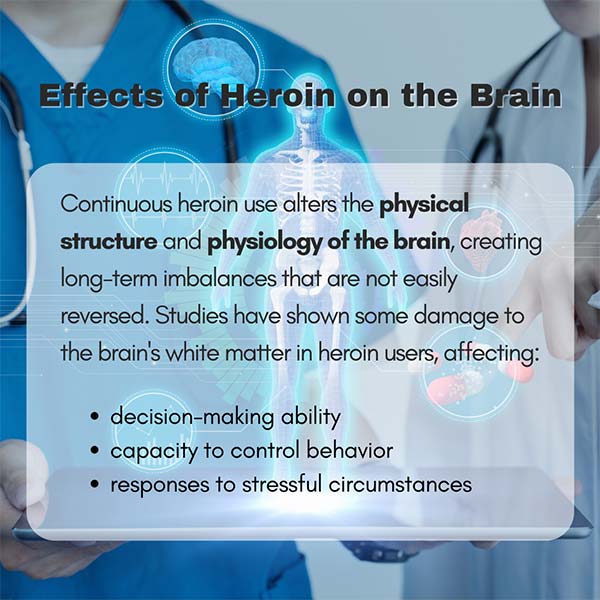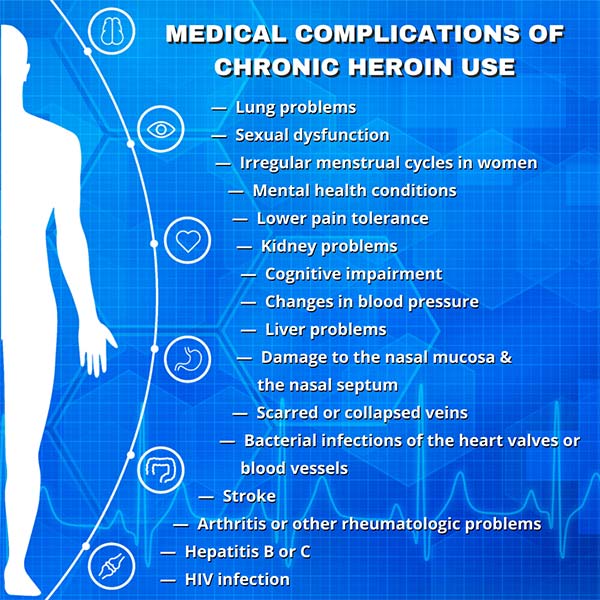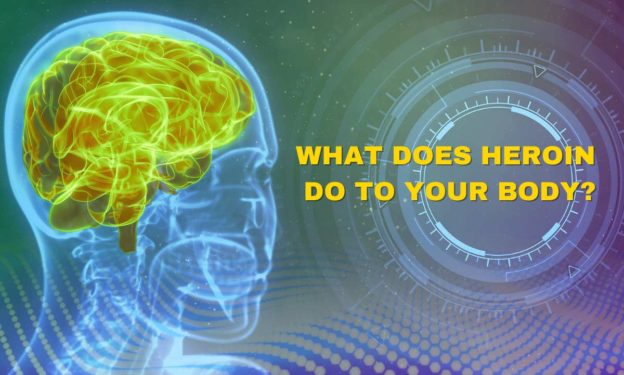What Does Heroin Do to the Body?
Heroin affects all of your major body systems, though it impacts some organs more than others. Over time, heroin takes a significant toll on your health. Learn what heroin does to the body and what the best treatment options are to reverse physiological damage from heroin abuse.
What are the Common Health Effects of Heroin?
Heroin is a highly addictive illicit drug derived from morphine. It is commonly snorted, sniffed, injected, or smoked. Each of these methods of use causes heroin to enter the brain rapidly and bind to opioid receptors. That interaction affects feelings of pain and pleasure, controls heart rate, sleep, and breathing ability.
Opioid receptors exist in many body systems, including the brain, spinal cord, heart, lungs, gastrointestinal tract, liver, and reproductive organs. Each of these organs responds differently to heroin. In general, heroin is a central nervous system depressant, decreasing the nervous system’s activity. This NS disturbance compromises the user’s ability to think and also their main vital functions.
What are the Short-Term and Long-Term Effects of Heroin Abuse?
Heroin abuse is extremely harmful to your physical and mental health. It results in short-term effects that occur within hours or days following use. Other heroin effects on the body may last for months or years.
For over 25 years, people from all over the world have chosen Waismann Method as their opioid detox provider.
We know the challenges you face and the importance of creating a unique and personal experience for you right from the start.Call for Detox Options 1-800-423-2482
Following are some of the short-term effects of heroin use:
-
- Nausea
- Vomiting
- Severe itching
- Dry mouth
- A warm or flushed feeling on the skin
- Arms and legs that feel heavy or “dead”
- Unclear thinking
- Moving between consciousness and unconsciousness
Call one of our admissions specialists today. Let us help you better the quality of your life and get the help you need today!
It is not recommended to detox cold turkey, or without professional supervision. At the Waismann Method® Opioid Detox Specialists, we offer rapid detox, medically assisted detox, and individualized guidance in addiction treatment.Call 1-800-423-2482
Long-term Effects
Continuous heroin use alters the physical structure and physiology of the brain, creating long-term imbalances that are not easily reversed.
Studies have shown some damage to the brain’s white matter in heroin users, affecting decision-making ability, the capacity to control behavior, and responses to stressful circumstances. Long-term heroin use also produces severe degrees of tolerance and physical dependence.
The long-term effects of heroin use differ for each person and may include:
- Changes in hormone levels
- Altered brain structure and function
- Loss of white matter within the brain
- Poor decision-making
- Tolerance, or the need for more heroin to achieve the same effects
- Physical dependence. Physical dependence occurs when the body adapts to the presence of the drug, and withdrawal symptoms occur if use abruptly decreases.
- Withdrawal, or symptoms that emerge if a person has not used heroin recently. Withdrawal symptoms include restlessness, bone pain, diarrhea, vomiting, chills, uncontrollable leg movements, and poor sleep.
- Addiction is a disorder characterized by continuous substance use regardless of its risk and damage to the users’ physical and mental health.
How Does Heroin Affect the Brain?
 The human brain is our most complex organ, so it makes sense that heroin’s effects on the brain are particularly problematic. Like other opioids, heroin crosses the protective blood-brain barrier to enter the brain directly. Many of these neurons have opioid receptors on their surfaces. Opioid receptors are unique binding sites that are only activated by opioid molecules. Therefore, you can think of it as an opioid key opening a particular lock.
The human brain is our most complex organ, so it makes sense that heroin’s effects on the brain are particularly problematic. Like other opioids, heroin crosses the protective blood-brain barrier to enter the brain directly. Many of these neurons have opioid receptors on their surfaces. Opioid receptors are unique binding sites that are only activated by opioid molecules. Therefore, you can think of it as an opioid key opening a particular lock.
Specific brain areas have more opioid receptors than others. In particular, areas that control pain, emotions, and pleasure have high levels of opioid receptors. When heroin activates receptors in these areas, they trigger a release of brain chemicals like dopamine. Dopamine is the brain’s pleasure chemical that is also released when eating, having sex, exercising, and doing other pleasurable activities.
Because dopamine makes you feel good, it causes you to want to keep using heroin. Basically, your brain says, “That was amazing! Let’s do it again.” Heroin use also changes the structure and functioning of the brain’s reward center. As these regions rewire, they disrupt a person’s ability to experience other sources of pleasure normally. This keeps people stuck in addiction. The rewired brain also affects areas involved in decision-making and judgment. Therefore, this may cause someone to keep using heroin despite the very negative personal and social consequences.
What are the Medical Complications of Chronic Heroin Use?
Using heroin once or twice may cause short-term problems with nausea, vomiting, and uncomfortable bodily sensations. However, recurrent heroin use over weeks or months takes a more considerable toll on your health.
The physical effects and dangers of heroin abuse include a greater risk of many medical complications, including:
- Lung problems, including difficulty breathing
- Higher susceptibility to lung infections like pneumonia, tuberculosis, and possibly COVID-19
- Sexual dysfunction, including erectile dysfunction or difficulty achieving orgasm for women
- Irregular menstrual cycles in women
- Depression
- Other mental health conditions
- Lower pain tolerance
- Kidney problems
- Cognitive impairment
- Changes in blood pressure
- Liver problems
- Damage to the nasal mucosa and the nasal septum (for those who snort heroin)
- Scarred or collapsed veins (for those who inject heroin)
- Bacterial infections of the heart valves or blood vessels
- Stroke
- Arthritis or other rheumatologic problems
- Hepatitis B or C (for those who inject heroin and share needles)
- HIV infection (for those who inject heroin and share needles)
Of course, one of the most significant medical complications of chronic heroin use is the risk of overdose and death. One study of people suffering from heroin dependence found that they had 17 times higher risk of death than their same-age peers. The risk of death is higher for men, older individuals, those who inject heroin, those who use multiple drugs in addition to heroin, and people with prior psychiatric hospitalizations.
Can the Physiological Damage from Heroin Abuse be Reversed?
Whether physiological damage from heroin abuse can be reversed has been the subject of considerable research. There are several deciding factors on how fast and if a person can completely heal from heroin use.
The issue is, there is not much data regarding heroin’s harm to the brain and how much of it is reversible. However, like many long-standing diseases, there are many success stories of people overcoming addiction and living full and healthy lives. Each day of sobriety is another day for your body and brain to heal and return to a healthy state.
Recovery is Possible
Recovery is possible, but it does take discipline and commitment.
The most rapid changes typically occur in the weeks and months after a person goes through opioid detox. During detox, the body no longer receives a regular dose of opioids. The discontinuation of heroin use leads to withdrawal symptoms, which can be uncomfortable and even dangerous for people with certain medical conditions. Heroin withdrawal typically begins 5 to 12 hours after the last dose and peaks within 36 to 72 hours. Although most studies show that heroin withdrawal symptoms often subside within five days, they are not considering the insertion of fentanyl on most heroin currently being sold in the USA.
Fentanyl-Laced Heroin
Drug dealers are currently adding fentanyl to most street drugs to increase their potency. The issue is that many users believe that they are purchasing heroin and have no idea they are actually obtaining a drug 50 times stronger than heroin, resulting in an outrageous number of overdoses. Fentanyl is fatal even in tiny doses. A two-milligram dose of fentanyl (similar to the size of two grains of salt) is a deadly dose for most people.
How to get through a Heroin Withdrawal?
Heroin withdrawal may be shortened or made more comfortable by using different medical detox protocols. As soon as the detox process begins, the brain and body begin to return to their normal state. This includes the regulation of hormones, electrolyte levels, and physiological processes.
By the time someone is several months post-detox, their body has often returned close to normal. However, some people may have some lingering side effects or health issues to deal with due to long-term heroin use.
Additionally, brain healing may take a longer period of time. Some research shows that people who have been sober for at least three years may still have altered brain connections. This brain function disruption might be why people formerly addicted to heroin remain vulnerable to relapse, though the risk of relapse decreases over time.
What are the Most Effective Heroin Addiction Treatment Methods?
There are various methods available to treat individuals suffering from heroin addiction. Some of the most common treatment methods include:
Residential and Outpatient Drug Rehab
Residential drug treatment centers can vary in length, therapeutic approach, religious beliefs, and even gender-specific programs. Many residential programs offer services for a wide range of addictions and psycho-social issues, while others specialize in a specific type of addiction and/or disorder. With outpatient drug treatment programs, the person is allowed to live at home and meet with counselors and/or doctors regularly.
Methadone and Suboxone
Withdrawal symptoms and cravings are often the number one reason for relapse in those suffering from heroin abuse. To minimize the symptoms of heroin withdrawal and cravings, many heroin detox programs utilize replacement drugs such as methadone and Suboxone. The goal of these heroin detox programs is to eventually help heroin abusers gradually wean off these newly introduced drugs while participating in a therapeutic recovery program. However, these drugs are very addictive themselves and have powerful binding effects on opioid receptors, making it very difficult for some patients to achieve the opiate detoxification they were hoping for.
Rapid Detox
During rapid detox, patients are placed under sedation in an accredited hospital and administered opioid antagonists that detach the opiates from the neuroreceptors. Patients are also sometimes given medications to mitigate withdrawal symptoms. This method can be an extremely humane, safe, and effective way to detox from heroin without experiencing the full effects of the painful withdrawal symptoms when properly administered.
Heroin rapid detox is an effective a safe solution when provided by experienced, board-certified, and responsible doctors. Although the process is fast compared to other heroin treatment programs, it is not and should not be considered an overnight solution. Patients should be admitted to an accredited hospital at least a day before rapid detoxification for a comprehensive medical evaluation, physical stabilization and to assure candidacy for the procedure. After rapid detox is completed, doctors should provide patients a few days of inpatient care to ensure this critical transitional period is secure and sustainable.
Medically Assisted Detox
Heroin withdrawal symptoms can be extremely uncomfortable, and in some cases, even dangerous. Alcohol withdrawal, in particular, can often be fatal. In order to successfully and safely detox from heroin, medically assisted detox options and medical supervision are extremely important.
Conclusion
Heroin is a serious drug of abuse that affects nearly every body system. Because of the way heroin changes the brain, it makes users vulnerable to heroin addiction. The effects of heroin abuse on the body can be extensive, and the consequences of an unsupervised detox, life-threatening. These significant health risks make it essential to seek qualified medical specialists to help reverse the effects of heroin abuse.
Taking the first step toward sobriety breaks the destructive relationship between heroin, the brain, and the body. Don’t wait. Heroin should not determine your fate.
Sources:
- US National Library of Medicine National Institutes of Health: Current Research on Opioid Receptor Function
- NIDA: Heroin Research Report. What are the medical complications of chronic heroin use?
- NIDA: New Evidence on Substance Use Disorders and COVID-19 Susceptibility
- National Library of Medicine: Drug-related mortality and fatal overdose risk
- Plos One: Aberrant Default-Mode Functional and Structural Connectivity in Heroin-Dependent Individuals
- NIDA: Prescription Opioids DrugFacts
- US National Library of Medicine National Institutes of Health: Pharmacologic treatments for opioid dependence: detoxification and maintenance options
- Wiley Online Library: Abnormal gray matter volume and resting-state functional connectivity in former heroin-dependent individuals abstinent for multiple years
Written by Aurora Harklute
Aurora is a neuropsychologist and freelance writer with more than ten years of experience with a bachelor’s degree in human physiology, a master’s degree in cognitive psychology, and a Ph.D. in clinical psychology. Aurora writes for a variety of industries within the substance abuse and medical fields. She also specializes in the impact of substance use on mood and cognition.
Reviewed by Clare Waismann, Registered Addiction Specialist (RAS), Substance Use Disorder Certified Counselor (SUDCC), founder of Waismann Method® Advanced Treatment for Opiate Dependence and Domus Retreat®. Clare Waismann is an authority and expert on opioid dependence, opioid use disorder, substance dependence, detoxification treatments, detox recovery, and other topics covered on RapidDetox.com.






